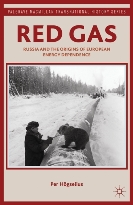Red Gas
Högselius, Per (2013), Red Gas: Russia and the Origins of European Energy Dependence. Palgrave Macmillan Transnational History Series (Basingstoke and New York: Palgrave Macmillan). Available as hardcover and paperback.
Read the introductory chapter.
Winner of the 2014 Marshall Shulman Book Prize, awarded by the Association for Slavic, East European, and Eurasian Studies (ASEEES).
Recommended by the Financial Times.
“This is a pioneering work. Since Jonathan Stern’s Soviet Natural Gas Development to 1990: The Implications for the CMEA and the West (1980) and Thane Gustafson’s Crisis amid Plenty: The Politics of Soviet Energy under Brezhnev and Gorbachev (1989), Russian gas exports to Europe have been the province not of historians but of energy specialists and political scientists trying to keep up with fast-moving events. The return to history is welcome. Högselius is admirably equipped for it, comfortable in several languages and as happy explaining what happened to the methane molecules and steel pipes as with events in boardrooms and embassies.” – American Historical Review
“One of the book’s great virtues is its broad and extensive empirical basis. Högselius uses archival materials from both sides of the Iron Curtain, presenting in-depth Soviet, Austrian, German, and Ukrainian perspectives on the evolving east–west gas trade. […] Good sources alone do not make a good book, however; they must be framed and interpreted. Högselius succeeds here as well, choosing a transnational historical angle to structure and organize his data, flavored with a large technical system approach. […] Högselius’s approach cannot but be praised, and his historical analysis is presented in a very insightful manner. In addition, the author’s chosen way of writing the history, without many sidesteps and historiographical digressions, makes this book very readable for nonhistorians and policymakers alike.” – Technology & Culture
“Red Gas is a fascinating study into the background and nature of Europe’s energy dependency on Russian natural gas. The volume benefits from a dispassionate treatment of a commendable breadth of archival sources, producing a prime example of transnational history, rich in present-day relevance. […] Everyone interested in energy issues or Cold War history will find this book easily approachable and interesting, bringing depth to a debate often monopolised by think tanks and media.” – Slovo
“Högselius has [… ] made a timely contribution to an understanding of the historical, as well as current, factors which will continue to influence future commercial relationships between the EU and Russia, as the former continues to demand natural gas imports and the latter seeks to maximise income from exports of that commodity.” – Journal of Contemporary European Studies
“Red gas is a brilliant and thorough work, based on meticulous studies conducted in Russian, Ukrainian and Western archives.” – Nowa Europa Wschodnia
“Per Högselius’ meticulously researched book tells the fascinating story of how it was possible for red gas to first cross the Iron Curtain only 10 days after the Red Army had brutally crushed the Prague Spring […] Red Gas will prove insightful reading for both specialists and those whose focus is not energy, as it gives a multi-faceted account of the history of East-West natural gas trade.” – ENERPO Journal
Some other prominent voices about Red Gas:
“Per Högselius demonstrates here both a mastery of archival sources in multiple languages and a deep appreciation for the challenges involved in Europe’s ‘hidden integration’—cultivating trust, reducing uncertainty, and replacing fear with interdependence. This is top quality transnational history.”—Philip Scranton, Rutgers University
“The first comprehensive study of the flow of gas between the USSR and Europe, this excellently researched book tells the fascinating story how Western Europe’s current dependence on Russian energy resources originated in the dynamics of the Cold War. It is a novel and eye-opening work, one that is truly important for students of history, environmental studies, and international relations.”—Helmuth Trischler, Director of the Rachel Carson Center for Environment and Society, Munich
“Red Gas is a pioneering contribution to transnational history writing. The book illustrates nicely that the ‘Iron Curtain’ was never as impenetrable as we might believe, and it proves unequivocally the catalytic power of infrastructures in overcoming ideological and national boundaries.”— Mikael Hård, Professor of History of Technology, Darmstadt University of Technology, Germany
“What did it take to organize the export of natural gas from the USSR to Europe, exports that reached 100 billion cubic meters annually? As Per Högselius shows in Red Gas, the Europeans and Soviets surprisingly reached a mutually beneficial accommodation even during the Cold War. The lessons of Red Gas are important today given the recent discovery of vast deposits in the Russian Arctic. Policy-makers, gas company officials, historians and other specialist will enjoy this richly-researched and well-written book.”—Paul Josephson
“Per Högselius is one of the younger historians of technology who acknowledge the trans-national and trans-technological impetus of modern infrastructures, especially when they serve to secure the flows of energy supply. Red Gas allocates some fresh perspectives on European history and beyond.”—Dirk van Laak, University of Giessen
“Red Gas is a concise empirical study of the development of the Eurasian natural gas pipeline system from the 1960s until now. In his balanced presentation of driving forces on both sides of the Iron Curtain the author is discovering the shape of a resource dictatorship that no longer is built on ideological ideas but on hard currency and economic principles.”—Karsten Rudolph, Head of Political Communication of the Evonik Group in Brussels and adjunct Professor for Contemporary History at the Ruhr-University Bochum

Trackbacks & Pingbacks